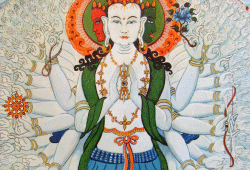  |
|
|
For a book of "scripture" it is very small (5,000 words); for a work about what cannot be told in words, it is ample. And its wisdom is, inexplicably, complete. It has been one of the major underlying influences in Chinese thought and culture, a true classic, and its words emerge in proverbs and folklore. The Tao Te Ching bears reading and re-reading. It is among the most widely read and frequently translated and cherished books in the world. Bearing the essence of Taoism, it is in many minds the wisest book ever written. Tao Te Ching: The Way and Its Power Contemplating the remarkable natural world, Lao Tsu felt that it was man and his activities which constituted a blight on the otherwise perfect order of things. Thus he counseled people to turn away from the folly of human pursuits and to return to one's natural wellspring.
The five colours blind the eye. The central vehicle of achieving tranquillity is the Tao, a term which has been translated as 'the way' or 'the path.' Whereas Confucianism is concerned with day-to-day rules of conduct, Taoism is concerned with a more spiritual level of being. Lao Tsu is also the author of the Hua Hu Ching, a small book purported to contain his "hidden" oral teachings. Perhaps even more than the well-known Tao Te Ching, it is brilliant in its simplicity.
Quotes "Chanting is no more holy than listening to the murmur of a stream, counting prayer beads no more sacred than simply breathing, religious robes no more spiritual than work clothes." "A leader is best when people barely know he exists, when his work is done, his aim fulfilled, they will say: we did it ourselves." "To lead people walk behind them." "Being deeply loved by someone gives you strength; loving someone deeply gives you courage." "Give a man a fish and you feed him for a day. Teach him how to fish and you feed him for a lifetime." "He who knows others is wise. He who knows himself is enlightened." "Health is the greatest possession. Contentment is the greatest treasure. Confidence is the greatest friend. Non-being is the greatest joy." "How could man rejoice in victory and delight in the slaughter of men?" "If you realize that all things change, there is nothing you will try to hold on to. If you are not afraid of dying, there is nothing you cannot achieve." "In dwelling, live close to the ground. In thinking, keep to the simple. In conflict, be fair and generous. In governing, don't try to control. In work, do what you enjoy. In family life, be completely present." "In the world there is nothing more submissive and weak than water. Yet for attacking that which is hard and strong nothing can surpass it." "Kindness in words creates confidence. Kindness in thinking creates profoundness. Kindness in giving creates love."
Links About Lao Tsu and the Tao Te Ching: http://www.taopage.org/laotzu/ The text of the Tao Te Ching on the Internet Classics Archive website (from MIT): http://classics.mit.edu/Lao/taote.1.1.html The Internet Encyclopedia of Philosophy: http://www.iep.utm.edu/l/laozi.htm From the Wikipedia: http://en.wikipedia.org/wiki/Laozi Explanations of how Lao Tsu's works relate to and improve everyday life and matters: http://www.thegreattao.com
|
|
The Chenrezig Project Snohomish County WA; Central Florida Tel: (206) 707-9944 info@chenrezigproject.org © 2006, 2015. The Chenrezig Project. All rights reserved. |
 Lao Tsu (Laozi, Lao Tzu) is the author of the Tao Te Ching, or "Book of The Way and its Power," containing a scant eighty-one "chapters," most of them smaller than a typical short paragraph. (There remains some scholarly debate as to whether he ever lived.)
Lao Tsu (Laozi, Lao Tzu) is the author of the Tao Te Ching, or "Book of The Way and its Power," containing a scant eighty-one "chapters," most of them smaller than a typical short paragraph. (There remains some scholarly debate as to whether he ever lived.)